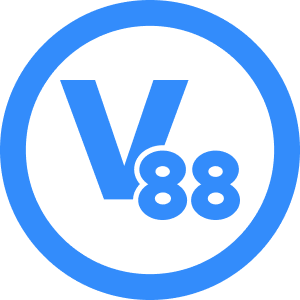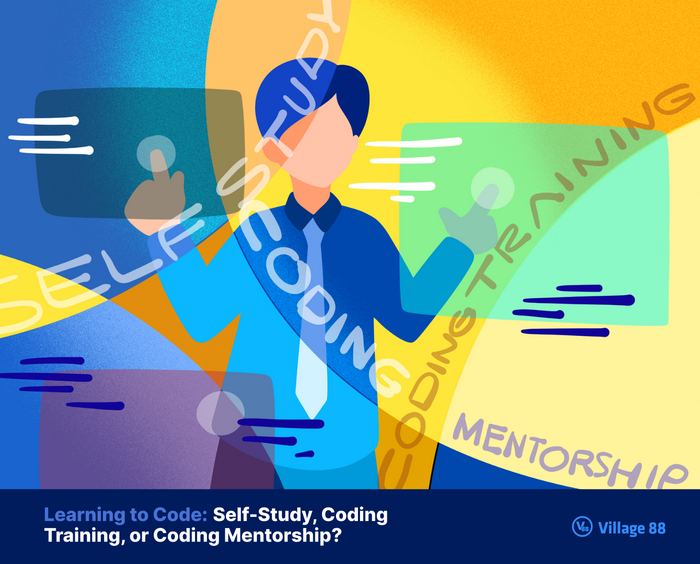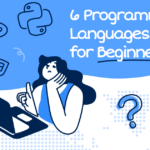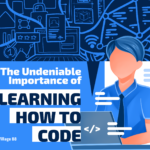There are so many ways you can approach your goal to learn to code aside from getting a tech-related degree if you don’t have one. Whether you’re just starting to learn to code or learning a new programming language to add to your arsenal, you have at least three options: self-study, coding training, or code mentorship.
Reaching industry-level skills can be pretty difficult, especially for those with little to no prior technical skills. So, let’s dig deeper into which works for who in this article — with the help of some of Village 88 Training Alumni.
Difference Between Self-Study, Coding Training, and Coding Mentorship
Self-Study
With almost everything now made available online, learning something as technical as programming is now easier to do than ever. You don’t need to go back to college to get a degree to learn to code. You have the option to be a self-taught programmer like Facebook CEO Mark Zuckerberg, Kevin Systrom of Instagram, and Twitter co-founder Jack Dorsey.
To self-study or be self-taught does not mean that you don’t have to go to school or have no instructor to learn from. When you choose to self-study, it means taking the initiative to excel in the pursuit of learning to code. You can learn to code as a side hustle while attending school. You don’t wait to be told what to do; you search for resources like training courses, watch videos on Youtube, read coding books, or join discussion groups about programming.
Self-study requires discipline, patience, and determination for one to succeed. So, let’s discuss the pros and cons of choosing to self-study.
Pros
- Learning to code independently helps master problem-solving skills
- Gain a better understanding of how things work by figuring things out on your own.
- Freedom. You can start to learn whenever or wherever you want.
- Self-study is cheaper. There’s a variety of free and paid online courses available.
Cons
- The temptation to just copy and paste codes from other resources without writing the programs.
- Discipline. It’s easier to lose motivation when studying alone.
- It can get lonely and frustrating when there’s no one to talk to when you get stuck.
- Google doesn’t always have the answers.
- Some online resources may be outdated.
- Self-study won’t teach the best practices developers should have.
- No certifications to vouch for skills on paper.
Coding Training
Coding training is an emerging market for those interested in learning to code without needing to complete a computer programming degree. Training can take from one week to six months, depending on the course you intend to take on. Some training courses focus only on one programming language, while others offer full-stack development courses.
Coding training sessions are either face-to-face in a classroom or online in a virtual classroom setting. Attending coding training helps beginner developers upskill to entry-level developers.
Like self-studying, there are still pros and cons to attending coding training.
Pros
- They are structured with a set industry-relevant curriculum that lays a foundation for beginners.
- There’s an instructor to guide you through coding learning.
- There are set practice sessions to apply what was learned through projects.
- Great for those who prefer a classroom setup where you can connect with peers.
- The classroom setup encourages good habits like code documentation, planning before coding, etc.
- Coding training simulates actual work life to foster an environment where the best software development practices are learned and practiced.
- Collaboration in pairs and groups is also part of the training.
- Some coding training includes résumé building, tech interview drills, and corporate ethics in the curriculum.
- Instructors and peers can assess and give developers feedback.
Cons
- The fixed curriculum may not suit your pace. You can’t skip over topics you already know. They can’t slow down for you if you don’t understand a concept and need more time.
- They are often expensive and require you to spend significant time, which can be difficult for those employed or with other obligations.
- You will need more than one programming language to create a product in the real world. Make sure you attend the training that covers the stack you need.
- Individual attention may be lacking because multiple learners will compete for guidance.
Coding Mentorship
Mentorship is defined as the influence, guidance, and direction of a mentor. By definition, mentors are individuals who influence their mentee’s personal and professional growth. Mentoring is not a new idea. It has existed and has been practiced in Ancient Greece. Mentors are experienced individuals in their chosen specialized fields who take it upon themselves to teach one or two of their juniors.
Coding mentorship is a growing open marketplace for beginner developers to connect with mentors worldwide. Code mentoring communities create opportunities for companionship and growth through knowledge-sharing sessions. So, let’s discuss the pros and cons of code mentoring.
Pros
- It can help simplify the learning process. Mentors can help you sort things out and get started.
- Someone with experience can assess your skills and guide you through what you need to work on, strategies that will work, and concepts that will matter in your chosen field.
- Mentors have real-world experience. They have the know-how of the tech development industry and can give you advice on what tools to use and technologies to focus on.
- Mentors can give insider tips to help you when you’re ready to apply for a developer position.
- They were in your shoes, so they know how to help you and walk you through difficult-to-understand concepts.
- Direct and immediate feedback on your progress. Mentors also know how to challenge you for your growth as a developer.
Cons
- Finding credible software development experts to mentor you for free can be difficult.
- Like any tutorial service, code mentorship can be pretty expensive. Some mentors charge $8 — $30 per 15 minutes, depending on the expertise.
- You might become dependent on your mentor to help you solve all the hurdles you’ll face while learning to code.
The Best of Which World
As we all know, there’s no perfect method for learning to code. There will be drawbacks, whichever you choose. So, how do you know which path to take? Simply assess yourself and weigh your options. You don’t have to choose just one. You can combine two of these approaches for the best result.
Self-study
- If you’re disciplined and motivated.
- If you prefer independent learning.
- If you don’t want to spend money on coding training.
Coding Training
- If you’re not as disciplined and lose motivation quickly.
- If you prefer a classroom setting with instructors and peers.
- If you have money to spare on coding training.
- If your goal is to apply for a tech development position, a coding training program certification is a great addition.
- If you want to get feedback on your progress, work with others, and learn good habits and practices.
Mentorship
- If you prefer focused guidance.
- If you have money to spare on paid mentorship.
- If you want real-world insider info, know-how, etc.
- If you wish to direct and immediate feedback.
Self-study + Coding Training
- If you want to improve the skills learned in self-study.
- If you wish to receive certification for specific technologies learned.
Self-study + Coding Mentorship
- If you want to level up your self-studied knowledge and skills.
- If you wish to focus guidance on concepts, you have difficulty understanding them.
Coding Training + Coding Mentorship
- If you want focused guidance with concepts you have difficulty understanding.
Meet Some of Village 88 Training’s Alumni
Self-study has its advantages, but there is so much more you can learn in coding training with a mentor to guide you along the way. Village 88 offers training with a world-class and proven effective curriculum taught by experienced mentors, exclusively for CS/IT grads in the Philippines, for free.
Here are some Village 88 Training Success Stories from our first batch of trainees.
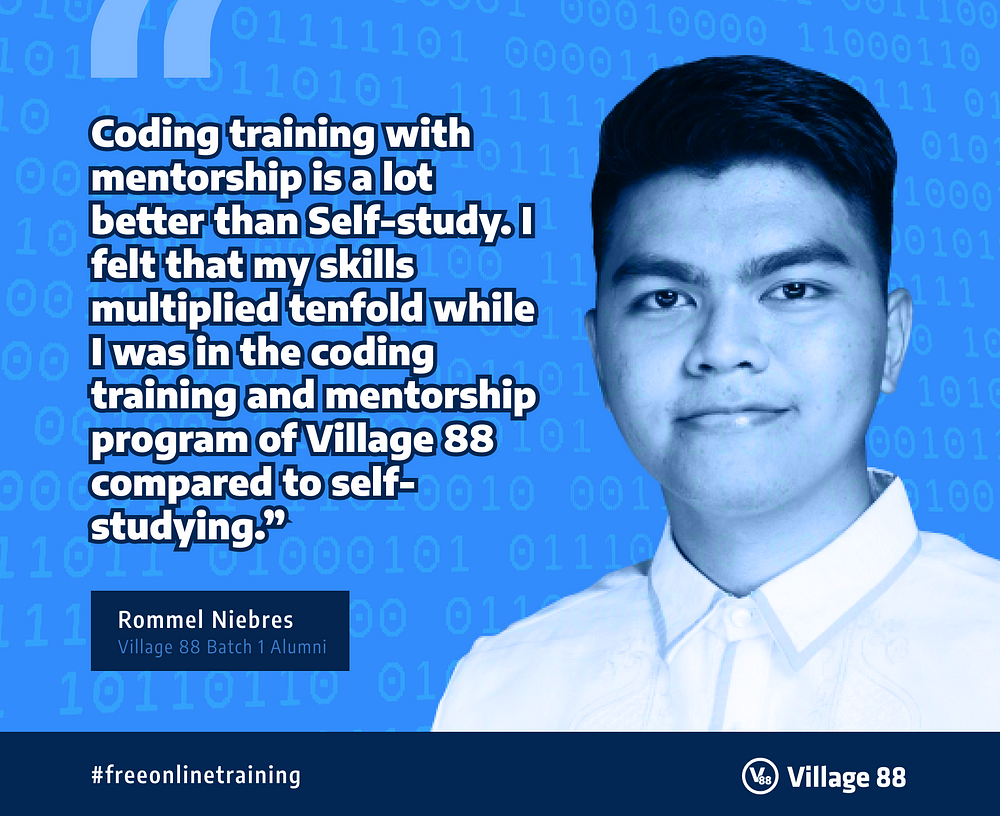
Rommel Niebres is one of our Junior Backend Software Engineers. What’s impressive is that he is not a CS/IT graduate but has a bachelor’s degree in Electronics and Communication Engineering. Rommel found his passion for programming when his degree required some programming subjects. He did some self-studying by watching videos about computer science and finished the online CS50 Course at Harvard.
According to Rommel, self-studying was challenging as it tested his discipline to remain focused in his endeavor. He also found it difficult to program on his own without anyone to work with. He joined the Village 88 Training when looking for a company willing to hire and train career-shifters like him. Although self-studying helped him in some regards, he realized during the training that a well-formed curriculum is more efficient and effective than self-studying.
You can check out Rommel Niebres Success Story on our Facebook Page to learn more about his journey.
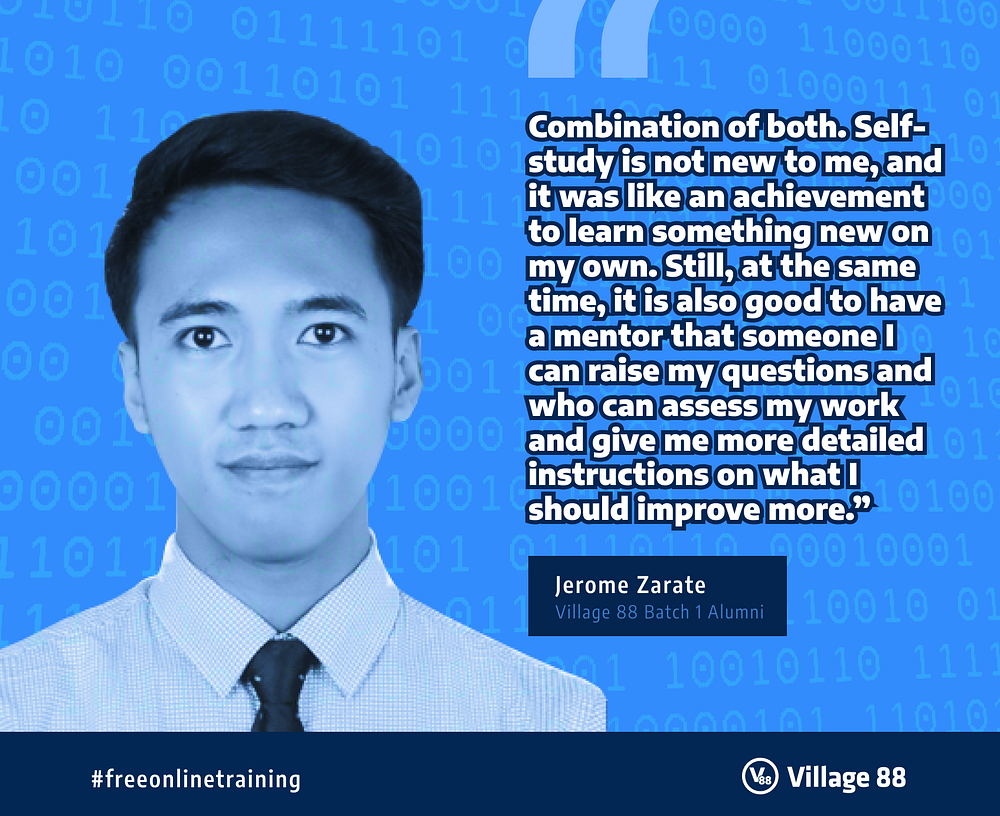
Jerome Zarate is also not a CS/IT graduate but has a degree in Electronics and Communication Engineering. According to Jerome, self-studying worked for him during his college days. He learned to code by watching video tutorials and searching the internet for resources. Still, he struggled with self-studying web development as most online resources are outdated, and he couldn’t find answers to some of the questions.
Jerome is now one of our Junior Backend Software Engineers. He joined Village 88 Training out of curiosity and wanted to experience Village 88 Training. Guess curiosity doesn’t always kill the cat.
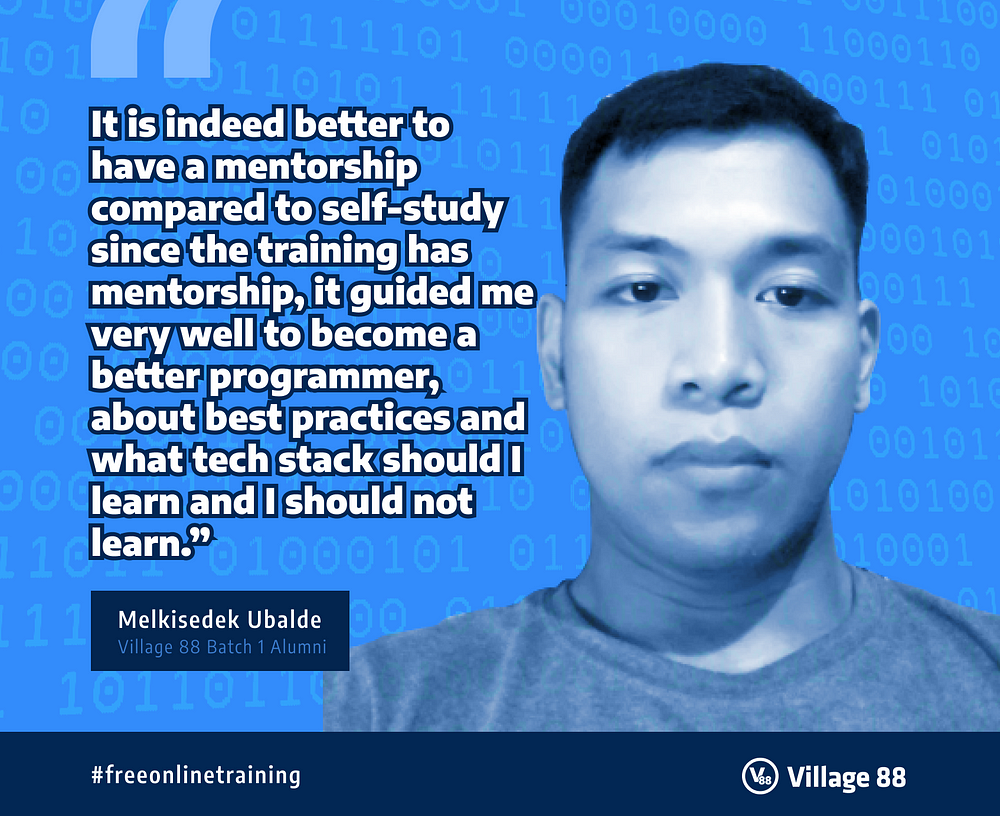
Melkisedek Ubalde has a degree in BS in Information Systems, and he self-studied web development for almost 12 hours a day by watching tutorials and building mini projects. He feels that self-study was somewhat effective but challenging since he didn’t know what tech stack to learn and which path he should take. According to Mel, he joined the Village 88 Training because he needed more knowledge about coding, the curriculum is better than other training, and it’s free.
After the training, Mel was hired as a Junior Backend Software Engineer. You can check out Melkisedek Ubalde’s Success Story on our Facebook Page to learn more about his journey.

Fitz Gerald Villegas has a degree in Bachelor of Science in Computer Engineering. According to him, he did some coding self-study in preparation for the Village 8 Training. He watched videos to regain previous knowledge and better understand Advanced Data Structures and Algorithms in programming.
Fitz thinks that self-studying had a tremendous impact as he began his career because he learned to be resourceful and explore what he learned in college. Despite all that, he found self-studying very difficult, especially when he didn’t have a roadmap to follow, and he started learning various topics without guidance. So, he decided to join the Village 88 Training because it is free, and there are mentors to guide them while training.
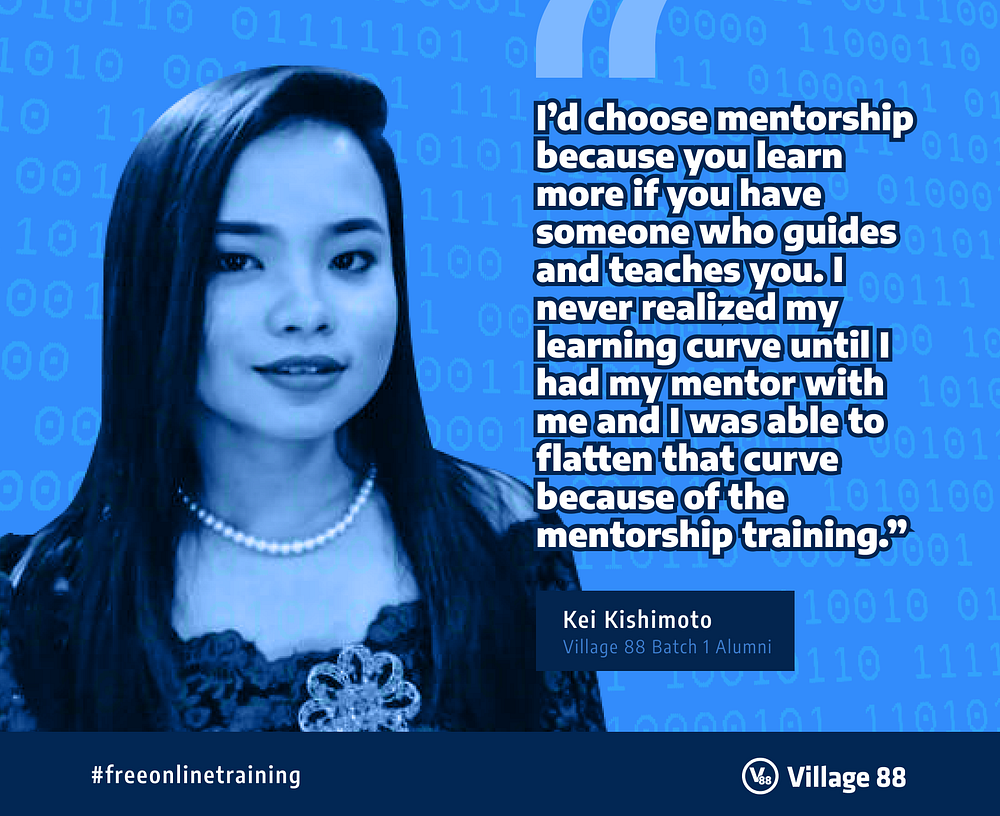
Kei Kishimoto is another career shifter. She has a degree in Business Administration and majored in Financial Management. At the age of 13, Kei began coding HTML, CSS, and ASCII-based programs but didn’t pursue a career in programming. She rekindled her passion for software and web development while working as a marketer at a tech company. She began self-studying by watching UI/UX videos and building several projects.
According to Kei, self-studying has its perks but was difficult because she grew dependent on videos as she coded along with the tutorials. She decided to join Village 88 Training because she saw the path she dreamed of achieving: designing and coding.
You can check out Kei Kishimoto’s Success Story on our Facebook Page to learn more about her journey.
Feel free to join Village 88 Training
You can join Village 88’s Training. We offer free training for fresh CS/IT graduates and non-CS/IT graduates with coding backgrounds. The training includes over thirty industry-relevant technologies that are currently in demand. This training is absolutely free, without hidden charges or future salary deductions when you land a job. No cost, no fee, just free.
We’d love to hear from you! You can check out our website to register or learn more about us. You can also contact us on our FB page for other inquiries. Together, we can achieve your programming goals! We’d love for you to join us.
You can also read 5 Proven Tips to Make Online Coding Training Worthwhile to learn some advice from Village 88 first batch Alumni on how they make the most out of their online coding training.
